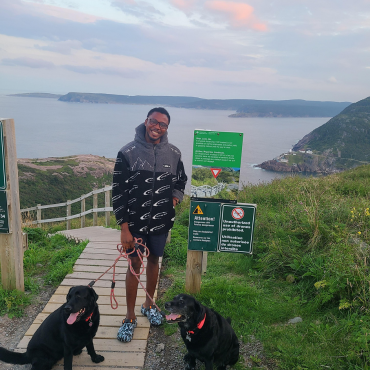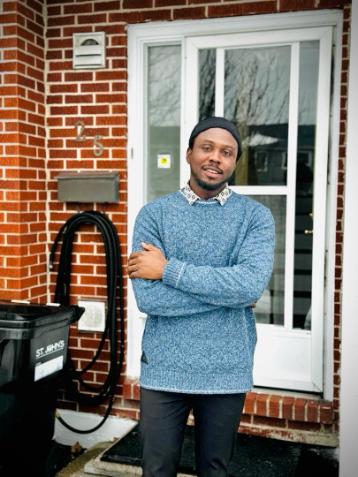Robert Ndum

Masters (Thesis) Student, Department of Community Health, Faculty of Medicine
Tell us about some of your research interests! What was the focus of your Master's thesis?
My research interest involves conducting research with Marine and Coastal workers in Atlantic Canada.
My research focus is on assessing key challenges these population face with return-to-work in the event of work injury or illness. Our primary concern towards these workforces is the fact that they are always on the move to and from work, which leaves us wondering: 'what happens if any of the workers were to have any injury either while going to work, while at work or while coming back from work?' This is particularly a serious concern because of several factors, including: under reporting of work accidents, delayed or unavailable access to healthcare, and unregulated policies and programs for short and long-term disability management for most of these workers.
What made you decide to come to Memorial to study? What has your experience been like?
I grew up in a small community in sub-Saharan Africa and spent my early childhood around rivers and water bodies. During this time, I was always intrigued by the fishing activities that were carried out by local fish harvesters. Something I always felt uncomfortable about was the fact that these fishermen never wore any PPE [personal protective equipment] like a PFD [personal flotation device].
I went on to complete a Bachelor’s degree in Physiology where I was exposed to various aspects of environmental physiology including marine areas and mountains. This rekindled my love for oceans and maritime activities, particularly safety at sea.
I specifically chose Memorial University because of its location. Memorial being located on an Island, and fully surrounded by the ocean, was a primary reason for me to come here. My decision to study at MUN was further informed by the prestige it holds, particularly that of the Marine Institute.
More so, I am thrilled by the research conducted here, in the space of Maritime Science, and I couldn’t be happier being a part of this workforce.
Every day I spend in St John’s, there is something interesting to learn: from the cultural diversity, to the extremely shifting weather, to the festivities, among other things.
What are you excited about right now?
In my senior year of undergrad, I completed a thesis project in the lab. Prior to this, I had done some fieldwork involving humans. I had few opportunities conducting human research during my undergrad. I started at MUN in the fall of 2023, and have been completing several courses in preparation for my research. I am particularly excited that I will be working on my ethics piece and my proposal in the spring term, as I look forward to delving into various aspects of my research, including recruitment and data collection, by the summer.
What are your plans for the future?
My short term goal is to attend at least two conferences prior to the completion of my Master’s degree. My long term plans revolve around proceeding to carry out further PhD research where I hope to explore further policies and programs for short and long term disability management with my strong drive for safety at sea and fast and safe return to work after work injury or illness.
What is something you want everyone to know about the ocean and/or the North?
The Ocean can be both a friend and a foe. I like to think of it as a friend when it comes to the North, because primarily more than half of the goods and services are transported in and out of the region through the Ocean.
